- Home
- Jr. Horatio Alger
Ben, the Luggage Boy; Or, Among the Wharves Page 4
Ben, the Luggage Boy; Or, Among the Wharves Read online
Page 4
CHAPTER IV.
A RESTAURANT ON FULTON STREET.
Ben kept on his way, looking in at the shop windows as before. He hadnot yet given up the idea of getting a place in a store, though he beganto see that his chances of success were rather small.
The next pause he came to was before a bookstore. Here, too, there wasposted on the window:--
"BOY WANTED."
Ben entered. There were two or three persons behind the counter. Theoldest, a man of forty, Ben decided to be the proprietor. He walked upto him, and said, "Do you want a boy?"
"Yes," said the gentleman. "We want a boy to run of errands, and deliverpapers to customers. How old are you?"
"Ten years old."
"That is rather young."
"I'm pretty strong of my age," said Ben, speaking the truth here, forhe was rather larger and stouter than most boys of ten.
"That is not important, as you will not have very heavy parcels tocarry. Are you well acquainted with the streets in this part of thecity?"
This question was a poser, Ben thought. He was at first tempted to sayyes, but decided to answer truthfully.
"No, sir," he answered.
"Do you live in the lower part of the city?"
"Yes, sir; that is, I'm going to live there."
"How long have you lived in the city?"
"I only arrived this morning," Ben confessed, reluctantly.
"Then I'm afraid you will not answer my purpose. We need a boy who iswell acquainted with the city streets."
He was another disqualification. Ben left the store a littlediscouraged. He began to think that it would be harder work making aliving than he had supposed. He would apply in two or three more stores,and, if unsuccessful, he must sell papers or black boots. Of the two hepreferred selling papers. Blacking boots would soil his hands and hisclothes, and, as it was possible that he might some day encounter someone from his native village, he did not like to have the report carriedhome that he had become a New York boot-black. He felt that hiseducation and bringing up fitted him for something better than that.However, it was not necessary to decide this question until he had gotthrough applying for a situation in a store.
He tried his luck again, and once was on the point of being engaged atthree dollars per week, when a question as to his parents revealed thefact that he was without a guardian, and this decided the questionagainst him.
"It's of no use," said Ben, despondently. "I might as well go back."
So he turned, and retraced his steps down Broadway. By the time he gotto the City Hall Park he was quite tired. Seeing some vacant seatsinside, he went in and sat down, resting his bundle on the seat besidehim. He saw quite a number of street boys within the inclosure, most ofthem boot-blacks. As a rule, they bore the marks of their occupationnot only on their clothes, but on their faces and hands as well. Some,who were a little more careful than the rest, were provided with a smallsquare strip of carpeting, on which they kneeled when engaged in"shining up" a customer's boots. This formed a very good protection forthe knees of their pantaloons. Two were even more luxurious, havingchairs in which they seated their customers. Where this extraaccommodation was supplied, however, a fee of ten cents was demanded,while the boot-blacks in general asked but five.
"Black your boots?" asked one boy of Ben, observing that our youngadventurer's shoes were soiled.
"Yes," said Ben, "if you'll do it for nothing."
"I'll black your eye for nothing," said the other.
"Thank you," said Ben, "I won't trouble you."
Ben was rather interested in a scene which he witnessed shortlyafterwards. A young man, whose appearance indicated that he was from thecountry, was waylaid by the boys, and finally submitted his boots to anoperator.
"How much do you want?"
"Twenty-five cents," was the reply.
"Twenty-five cents!" exclaimed the customer, aghast. "You're jokin',aint you?"
"Reg'lar price, mister," was the reply.
"Why, I saw a boy blackin' boots down by the museum for ten cents."
"Maybe you did; but this is the City Hall Park. We're employed by thecity, and we have to charge the reg'lar price."
"I wish I'd got my boots blacked down to the museum," said the victim,in a tone of disappointment, producing twenty-five cents, which waseagerly appropriated by the young extortioner.
"I say, Tommy, give us a treat, or we'll peach," said one of the boys.
Tom led the way to the ice-cream vender's establishment, where withreckless extravagance he ordered a penny ice-cream all round for thehalf-dozen boys in his company, even then making a handsome thing out ofthe extra pay he had obtained from his rustic patron.
By this time it was half-past two o'clock. So Ben learned from the CityHall clock. He was getting decidedly hungry. There were apple and cakestands just outside the railings, on which he could have regaledhimself cheaply, but his appetite craved something more solid. There wasa faint feeling, which nothing but meat could satisfy.
Ben had no idea how much a plate of meat would cost at a restaurant. Hehad but twenty-two cents, and whatever he got must come within thatlimit. Still he hoped that something could be obtained for this sum.
Where to go,--that was the question.
"Can you tell me a good place to get some dinner?" he asked of a boy,standing near him.
"Down on Nassau Street or Fulton Street," was the reply.
"Where is Fulton Street?" asked Ben, catching the last name.
"I'm goin' that way. You can go with me if you want to."
Ben readily accepted the companionship proffered, and was led past themuseum, the site of which, as I have said, is now occupied by the HeraldBuilding.
Turning down Fulton Street, Ben soon saw a restaurant, with bills offare displayed outside.
"That's a good place," said his guide.
"Thank you," said Ben.
He scanned the bill in advance, ascertaining to his satisfaction that hecould obtain a plate of roast beef for fifteen cents, and a cup ofcoffee for five. This would make but twenty cents, leaving him a balanceof two cents.
He opened the door and entered.
There was a long table running through the centre of the apartment, fromthe door to the rear. On each side, against the sides of the room, weresmall tables intended for four persons each. There were but few eating,as the busy time at down-town restaurants usually extends from twelve tohalf-past one, or two o'clock, and it was now nearly three.
Ben entered and took a seat at one of the side tables, laying his bundleon a chair beside him.
A colored waiter came up, and stood awaiting his orders.
"Give me a plate of roast beef," said Ben.
"Yes, sir. Coffee or tea?"
"Coffee."
The waiter went to the lower end of the dining-room, and called out,"Roast beef."
After a brief delay, he returned with the article ordered, and a cup ofcoffee.
There were two potatoes with the meat, and a small piece of bread on theside of the plate. The coffee looked muddy, and not particularlyinviting.
Ben was not accustomed to the ways of restaurants, and supposed that, asin shops, immediate payment was expected.
"Here's the money--twenty cents," he said, producing the sum named.
"Pay at the desk as you go out," said the waiter.
Ben looked up, and then for the first time noticed a man behind acounter in the front part of the room.
At the same time the waiter produced a green ticket, bearing "20 cents"printed upon it.
Ben now addressed himself with a hearty appetite to the dinner. Theplate was dingy, and the meat neither very abundant nor very tender.Still it can hardly be expected that for fifteen cents a large plate ofsirloin can be furnished. Ben was not in a mood to be critical. At homehe would have turned up his nose at such a repast, but hunger is verywell adapted to cure one of fastidiousness. He ate rapidly, and feltthat he had seldom eaten anything so good. He was sorry there wa
s nomore bread, the supply being exceedingly limited. As for the coffee hewas able to drink it, though he did not enjoy it so well. It tasted asif there was not more than a teaspoonful of milk in the infusion, whilethe flavor of the beverage differed strangely from the coffee he hadbeen accustomed to get at home.
"It isn't very good," thought Ben; and he could not help wishing he hada cup of the good coffee his mother used to make at home.
"Have anything more?" asked the waiter, coming up to the table.
Ben looked over the bill of fare, not that he expected to get anythingfor the two cents that still remained to him, but because he wanted tonotice the prices of different articles. His eye rested rather longinglyon "Apple Dumplings." He was very fond of this dish, and his appetitewas so far from being satisfied that he felt that he could have easilydisposed of a plate. But the price was ten cents, and of course it wasentirely beyond his means.
"Nothing more," said he, and rose from his seat.
He went up to the counter and settled his bill, and went out again intothe street. He felt more comfortable than he had done, as one is veryapt to feel after a good dinner, and Ben's dinner had been a good one,his appetite making up for any deficiency in the quality.
Where should he go now?
He was still tired, and did not care to wander about the streets.Besides, he had no particular place to go to. He therefore decided towalk back to the City Hall Park, and sit down on one of the benches.There would be something to see, and he was interested in watching thestreet boys, whose ranks he felt that he should very soon be compelledto join. His prospects did not look particularly bright, as he was notprovided with means sufficient to pay for another meal. But the time hadnot yet come to trouble himself about that. When he got hungry again, hewould probably realize his position a little more keenly.

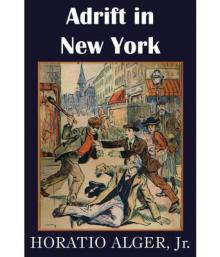 Adrift in New York: Tom and Florence Braving the World
Adrift in New York: Tom and Florence Braving the World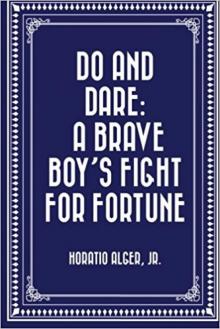 Do and Dare — a Brave Boy's Fight for Fortune
Do and Dare — a Brave Boy's Fight for Fortune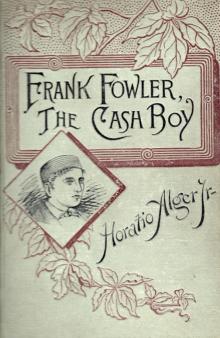 The Cash Boy
The Cash Boy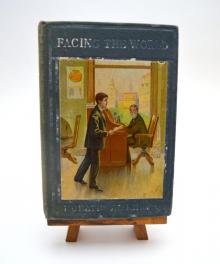 Facing the World
Facing the World The Young Explorer; Or, Claiming His Fortune
The Young Explorer; Or, Claiming His Fortune The Store Boy
The Store Boy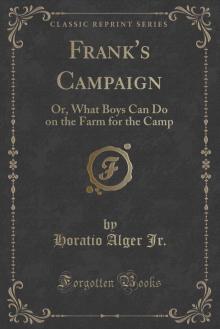 Frank's Campaign; Or, The Farm and the Camp
Frank's Campaign; Or, The Farm and the Camp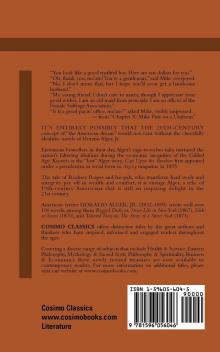 Cast Upon the Breakers
Cast Upon the Breakers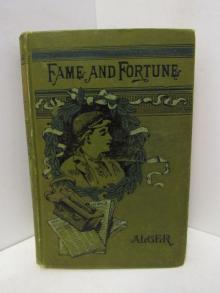 Fame and Fortune; or, The Progress of Richard Hunter
Fame and Fortune; or, The Progress of Richard Hunter The Errand Boy; Or, How Phil Brent Won Success
The Errand Boy; Or, How Phil Brent Won Success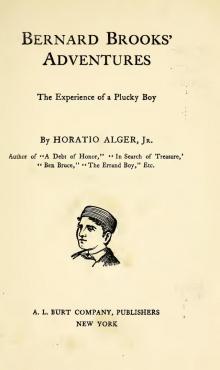 Bernard Brooks' Adventures: The Experience of a Plucky Boy
Bernard Brooks' Adventures: The Experience of a Plucky Boy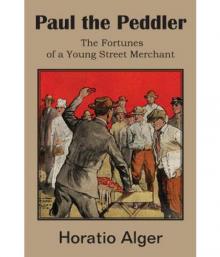 Paul the Peddler; Or, The Fortunes of a Young Street Merchant
Paul the Peddler; Or, The Fortunes of a Young Street Merchant Brave and Bold; Or, The Fortunes of Robert Rushton
Brave and Bold; Or, The Fortunes of Robert Rushton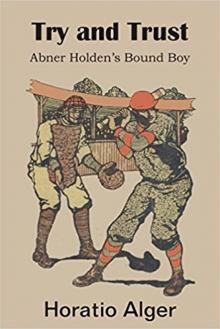 Try and Trust; Or, Abner Holden's Bound Boy
Try and Trust; Or, Abner Holden's Bound Boy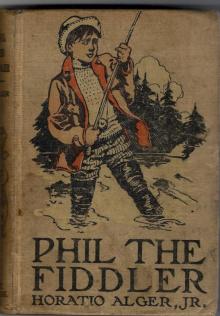 Phil, the Fiddler
Phil, the Fiddler In A New World; or, Among The Gold Fields Of Australia
In A New World; or, Among The Gold Fields Of Australia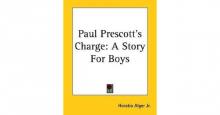 Paul Prescott's Charge
Paul Prescott's Charge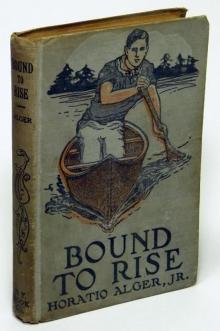 Joe's Luck; Or, Always Wide Awake
Joe's Luck; Or, Always Wide Awake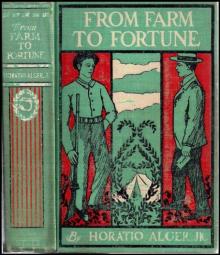 From Farm to Fortune; or, Nat Nason's Strange Experience
From Farm to Fortune; or, Nat Nason's Strange Experience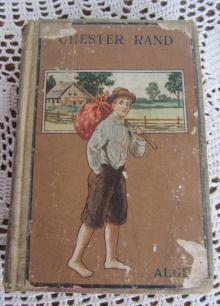 Chester Rand; or, The New Path to Fortune
Chester Rand; or, The New Path to Fortune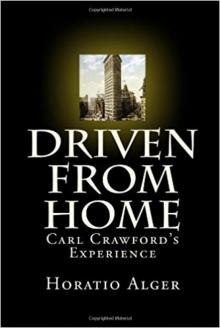 Driven from Home; Or, Carl Crawford's Experience
Driven from Home; Or, Carl Crawford's Experience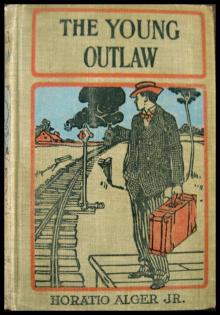 The Young Outlaw; or, Adrift in the Streets
The Young Outlaw; or, Adrift in the Streets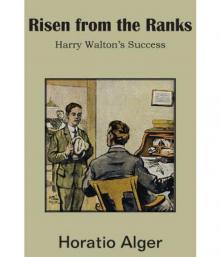 Risen from the Ranks; Or, Harry Walton's Success
Risen from the Ranks; Or, Harry Walton's Success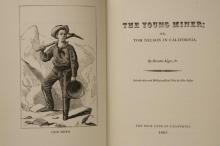 The Young Miner; Or, Tom Nelson in California
The Young Miner; Or, Tom Nelson in California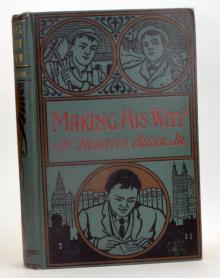 Making His Way; Or, Frank Courtney's Struggle Upward
Making His Way; Or, Frank Courtney's Struggle Upward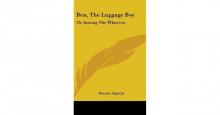 Ben, the Luggage Boy; Or, Among the Wharves
Ben, the Luggage Boy; Or, Among the Wharves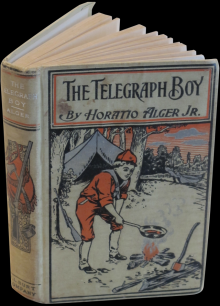 The Telegraph Boy
The Telegraph Boy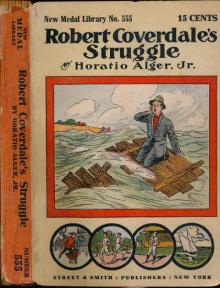 Robert Coverdale's Struggle; Or, on the Wave of Success
Robert Coverdale's Struggle; Or, on the Wave of Success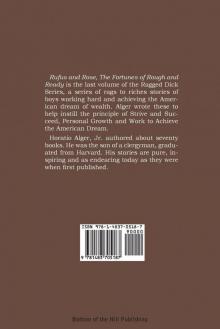 Rufus and Rose; Or, The Fortunes of Rough and Ready
Rufus and Rose; Or, The Fortunes of Rough and Ready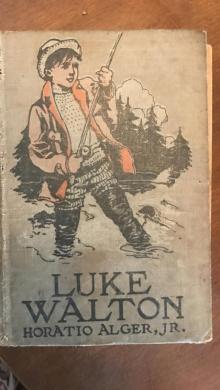 Luke Walton
Luke Walton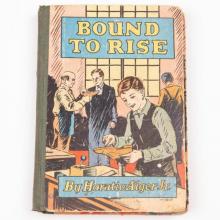 Mark Mason's Victory: The Trials and Triumphs of a Telegraph Boy
Mark Mason's Victory: The Trials and Triumphs of a Telegraph Boy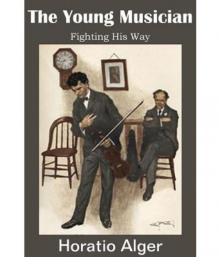 The Young Musician; Or, Fighting His Way
The Young Musician; Or, Fighting His Way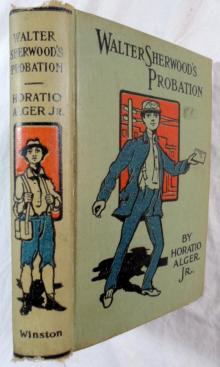 Walter Sherwood's Probation
Walter Sherwood's Probation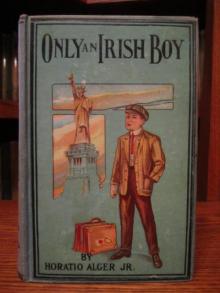 Only an Irish Boy; Or, Andy Burke's Fortunes
Only an Irish Boy; Or, Andy Burke's Fortunes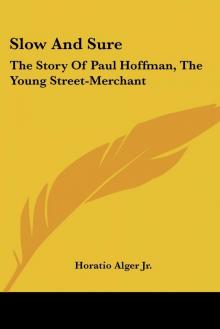 Slow and Sure: The Story of Paul Hoffman the Young Street-Merchant
Slow and Sure: The Story of Paul Hoffman the Young Street-Merchant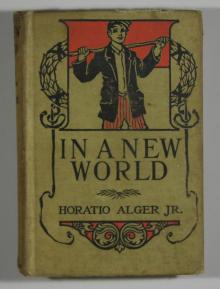 Herbert Carter's Legacy; Or, the Inventor's Son
Herbert Carter's Legacy; Or, the Inventor's Son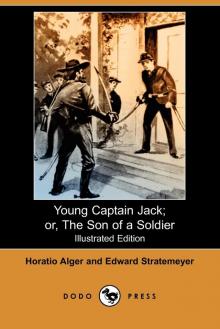 Young Captain Jack; Or, The Son of a Soldier
Young Captain Jack; Or, The Son of a Soldier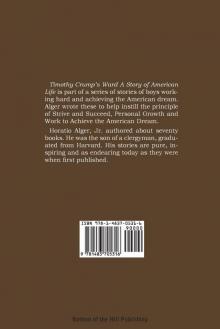 Timothy Crump's Ward: A Story of American Life
Timothy Crump's Ward: A Story of American Life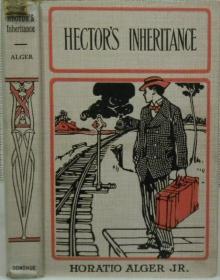 Hector's Inheritance, Or, the Boys of Smith Institute
Hector's Inheritance, Or, the Boys of Smith Institute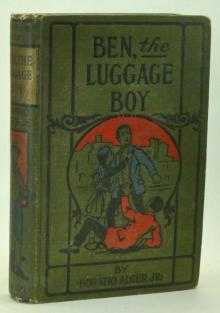 Ben's Nugget; Or, A Boy's Search For Fortune
Ben's Nugget; Or, A Boy's Search For Fortune